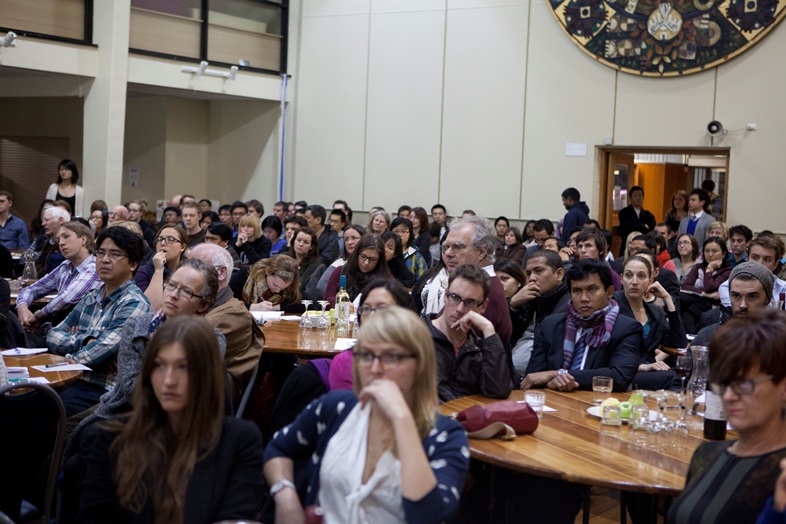On Monday night I had the great honour of sharing a stage here at the Australian National University with Sandar Min, Phyo Zeya Thaw and Phyo Min Thein, three of Burma’s newly elected National League for Democracy Members of Parliament. They were in Australia supported by the international outreach arm of the Australian Labor Party, and addressed a bumper audience at Bruce Hall. The other speakers were Janelle Saffin MP and Dr Jane Ferguson.
A comprehensive account of the event is available from the ANU College of Asia and the Pacific website.
During their days in Canberra the NLD delegation also met with Foreign Minister Bob Carr. You can read Mr Carr’s take on that meeting here.
At the ANU event my remarks were made immediately before the evening lurched into a wide-ranging Question and Answer session. The following text reflects, to a large extent, what I ended up saying. For those who are interested, a video of the event, including the speeches by the NLD MPs, should be available soon.
********
Good evening ladies and gentlemen,
Thank you to Jessica Avalon and the Asia Pacific Learning Community for organising this evening’s event. This must be one of the best attended discussions of Myanmar’s politics I have ever seen. It is a credit to all who have participated. It is truly a beautiful evening when we can welcome Myanmar’s elected democrats to Canberra and benefit from their unfiltered views on the country’s future.
Tonight it is my unenviable duty to follow such distinguished speakers. They have provided us with much analytical insight and fresh information. In the hope of leading us into a fruitful Question and Answer session let me offer a very brief, critical appreciation of what might happen next in Myanmar.
In Myanmar today there is an understandable urge to see everything change, right now. With 43 National League for Democracy representatives endorsed by the people to take part in the official political conversation there are reasons for great optimism. Nobody can remember a time when Myanmar’s people could dare to dream like they can today. And not just dream but also vote, debate, scrutinise. However, I think there are reasons to consider the prospects for change with one eye on the problems just over the horizon.
So to fertilise our discussion of what happens next in Myanmar let me offer four areas where Burma’s government, whether led by President Thein Sein or President Aung San Suu Kyi, will need to work with diligence, goodwill and savvy. This will be a bumpy road, with countless obstacles and hidden dangers.
First, there is the issue of demilitarising the political elite. Perhaps we saw the first signs of this when one of the Vice Presidents, former general and decorated combat commander Tin Aung Myint Oo, stepped down from his post last week. Maybe other senior figures, to include most of the President’s cabinet, will one day be replaced by civilians. In Myanmar, the process of demilitarisation will need to be extensive; it will, I’d suggest, last a generation. No country in Southeast Asia has completely taken the military out of politics but there are some in the neighbourhood, such as Thailand, where history offers warnings about the uniquely destabilising potential of a coup-prone army. Myanmar doesn’t want to go down that path.
Second, if Myanmar hopes to avoid that path it needs to find more productive outlets for the energy of the army’s 400,000 troops; killing Kachin in the re-ignited war in northernmost Myanmar is hardly the way forward. My humble suggestion to the President is to declare a unilateral ceasefire, take armed force off the agenda, and get the Kachin to the negotiating table in a more meaningful way. The President should, in my mind, lead the negotiations himself. In Myanmar ending inter-ethnic civil war is a President’s job. I also guess there is a Nobel Prize waiting for whoever can finally bring Burma’s many ethnic groups into peaceful coexistence.
Third, there is the problem of grinding poverty in many regions of the country. Myanmar is, as our colleagues from the NLD will attest, still a very poor place. Its economy need injections of capital, and will also benefit if some of the millions of Burmese scattered to the four corners of the earth decide to try their luck back at home. Economic transformation will be just as important as the political reforms we see today.
Fourth, there is the need for national reconciliation. Truth and reconciliation will go hand-in-hand. Accounting for the horrors of the past will be a crucial step forward. 1988. 2007. Everything. Among ethnic minorities, especially, peace will only come with justice. Ceasefire stalemates will need to be followed by long-lasting and sustainable peace.
These four issues–demilitarisation, ethnic war, poverty and national reconciliation–will loom large for many years to come. There is also a chance, however modest, that factions in the armed forces will disavow the reformist instincts of the President and his men. A coup would be disastrous, and is the last thing Myanmar needs right now. It is only by working through the messiness of political participation that things will improve.
On that note it is promising that the current government is even prepared to consider these challenges. And it is a credit to so many Burmese, including those who join us here this evening, that Myanmar is heading in such a positive direction.
Hope has returned to their beautiful country. We all wish them the very best of luck.
 Facebook
Facebook  Twitter
Twitter  Soundcloud
Soundcloud  Youtube
Youtube  Rss
Rss 